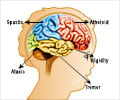Adults with cerebral palsy (CP) are at a higher risk of developing mental health disorders, reveals a new study.

TOP INSIGHT
Adults with cerebral palsy (CP) are more prone to mental health problems. Hence, improving clinical screening strategies, and developing efficient referral resources for mental health care services may help reduce the burden of mental health disorders in this population.
Read More..
A team of researchers from the University of Michigan studied a patient database to determine the prevalence of mental health disorders among adults with CP compared with those without CP. They found that men and women with CP alone had higher age-standardized prevalence than men and women without CP for schizophrenic disorders, mood affective disorders, anxiety disorders, and disorders of adult personality and behavior. Men with CP also had higher rates of alcohol- and/or opioid-related disorders, whereas women with CP did not.
According to the research team, these findings suggest that increasing clinical awareness of the mental health disorders and risks among adults with CP, improving clinical screening strategies, and developing efficient referral resources for mental health care services may help reduce the burden of mental health disorders in this population.
According to the authors of an accompanying editorial from Oregon State University, this research is important because it shines a light on an important issue facing a vulnerable population. The editorialists suggest that physicians may require additional training to care for adults with developmental disabilities so that these patients can get the care they need. It is also important to recognize the stressors faced by this population that can contribute to their mental health, such as trauma from abuse, neglect, intrusive therapeutic procedures, poverty, and social isolation.
Source-Eurekalert
 MEDINDIA
MEDINDIA



 Email
Email










